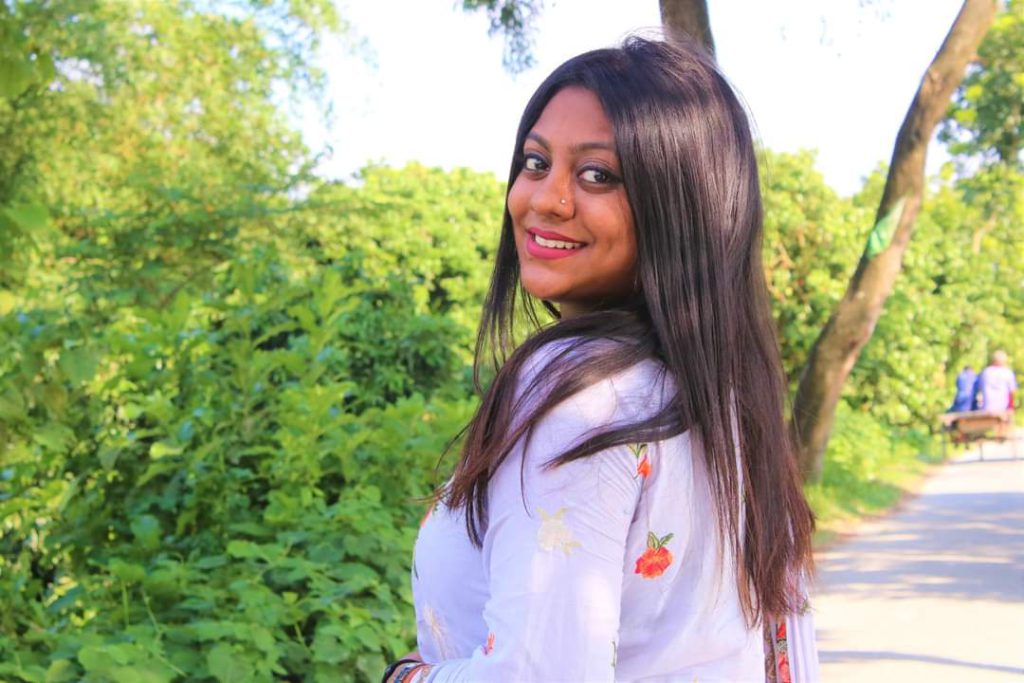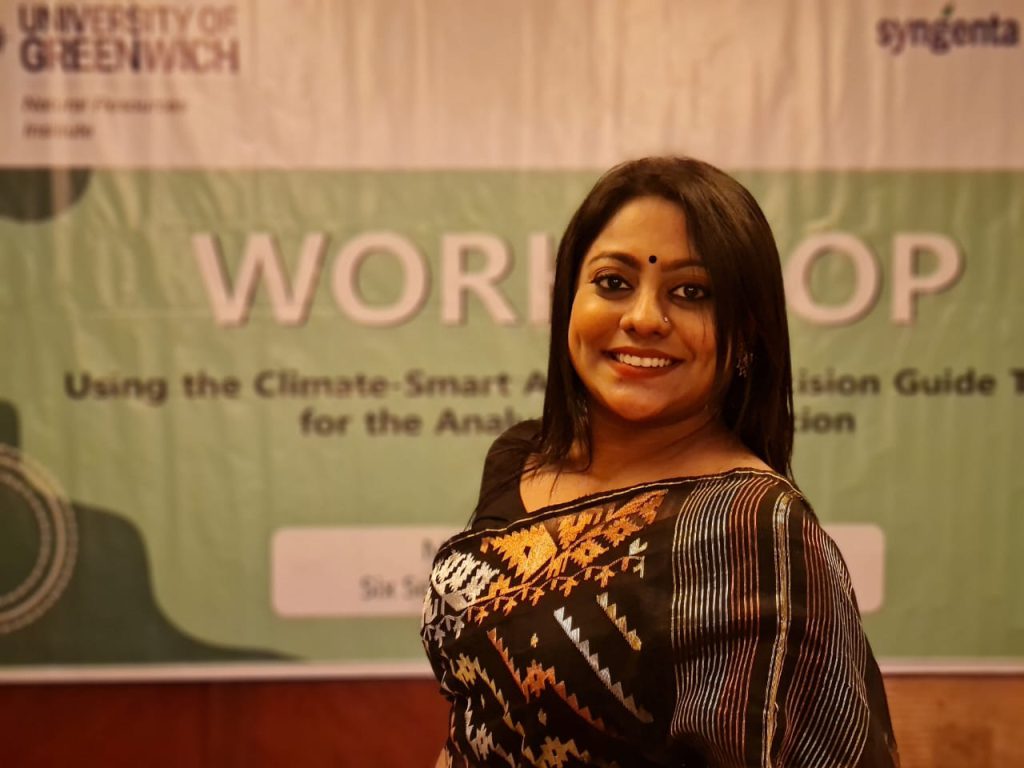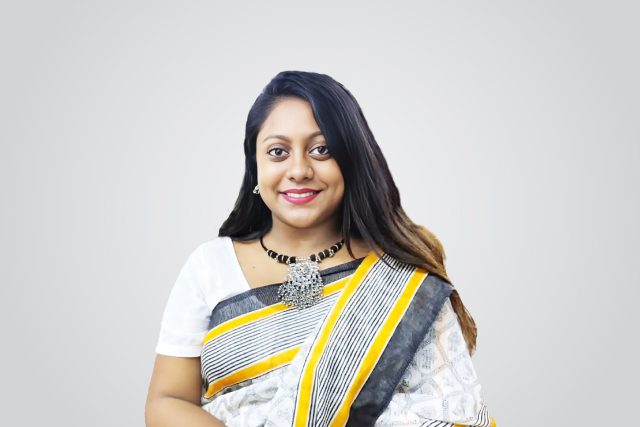Jasia Mehjabin Haque
Communication Specialist
Syngenta Foundation
Jasia Mehjabin Haque is a seasoned Communication Specialist at the Syngenta Foundation, where she excels in crafting compelling narratives and fostering meaningful connections. With a passion for effective communication, Jasia plays a pivotal role in conveying the Foundation’s mission and impact to diverse audiences. Her expertise in strategic messaging and engagement strategies makes her an invaluable asset in advancing the Syngenta Foundation’s goals of sustainable agriculture and rural development.
Let’s learn about her journey.
The InCAP: Ms. Jasia Mehjabin Haque, please share your academic and professional peregrination for our readers!
Ms. Jasia Mehjabin Haque: Thank you for selecting me as a promising professional, I’d like to share my journey through academia and my professional life with you. From a young age, I was always eager to acquire new knowledge, and this enthusiasm paved the way for my educational and career endeavors.
My educational voyage commenced at Scholastica, where I took my initial steps towards learning. Subsequently, I attended Mohammadpur Preparatory School and College for my early education. During my high school years, I had the privilege of studying at Shaheed Bir Uttam Lt. Anwar Girls College. My academic journey continued as I pursued a Bachelor’s degree in Applied Linguistics and English Language Teaching at BRAC University. This was a significant milestone, but it was only the beginning. I went on to earn a Master’s degree in ELT from the University of Dhaka’s Institute of Modern Languages.
Reflecting on my academic journey, I can say that it has been a transformative and enriching experience. I always excelled as a student, but my years pursuing a Master’s degree at DU were undoubtedly the most enjoyable. Every aspect of the program fascinated me, and I relished every moment of it. What’s unique about my academic path is that I had the opportunity to experience both private and public educational institutions in Bangladesh. This allowed me to witness the contrasting facets of the education system. While the quality of education remained consistently high, the teaching methodologies and approaches differed significantly.
As a child, my passion for learning was complemented by my eagerness to engage in volunteer work. I possessed a natural inclination towards leadership from a young age, often taking the lead in various activities. Initially, I worked as a teacher then started working part-time as a paid volunteer at Asiatic Marketing agency to earn some pocket money. My journey as an earner began in 2014, and although the income was modest, it enabled me to acquire a diverse set of skills.
My professional career commenced as a teacher at Cardiff International School, an English-medium institution located in Dhanmondi. I received tremendous support from the school’s principal and my colleagues, yet, I soon realized that teaching wasn’t my true calling, and I wasn’t finding the fulfillment I sought in this profession. Consequently, I decided to pivot towards the NGO sector, a realm I had always been fascinated by due to its unique challenges and potential for meaningful impact.
During my time at BRAC University, I had the opportunity to gain early exposure to the development sector of Bangladesh. The impactful and sustainable work being carried out in this domain inspired me greatly. Eventually, I secured employment at BRAC Ngo as a Material Developer for the Myanmar Teachers Professional Development (MCTPD) project, where I played a crucial role in assessing the needs of Rohingya learners. My responsibilities included analyzing their professional requirements, making training manuals and providing training on the materials.
However, I continued to search for a role that would allow me to fully unleash my creative potential. I had always nurtured a passion for creative work, and I yearned for an opportunity to pursue it. Consequently, I began applying for jobs in the communication sector, recognizing the pivotal role communications plays in any organization.
As I continued my job search, I gradually found a fitting opportunity at the Syngenta Foundation for Sustainable Agriculture, a Switzerland-based International Non-Government Organization. I secured the position of Communication Specialist for the Nutrition in City Ecosystems (NICE) project after successfully passing a series of rigorous assessments. In my current role, I am responsible for communication within the NICE project, where I contribute my skills and creativity to promote sustainable agriculture and nutrition initiatives. This position not only allows me to pursue my passion for creative work but also aligns with my commitment to making a positive impact on society.
In conclusion, my journey through education and career has been marked by a relentless pursuit of knowledge, a passion for volunteerism, and a deep desire to contribute to the betterment of society. From my early years as a student to my current role as a Communication Specialist, I have been fortunate to experience diverse opportunities that have shaped me both personally and professionally. Each step of this journey has contributed to my growth and has reinforced my belief in the power of education and communication to drive positive change.
Can you briefly describe your role as a Communication Specialist at Syngenta Foundation and some key responsibilities?
My role as a communication specialist is to work as a lead of one outcome of the Nutrition in City Ecosystems NICE project. Here, I have to work with the national and global policymakers. Then shape the urban and rural food environment by exchanging the acquired knowledge from the cities. This is a nutrition-based project here I have to highlight the importance of the nutrition of the women and the youth for the city dwellers. My specific works are,
I have to convey information, promote awareness, and facilitate effective communication within the project.
1. Develop Communication Strategies: Create comprehensive communication plans and strategies that outline the project’s goals, target audience, and key messages.
2. Content Creation: Generate high-quality content such as articles, reports, brochures, infographics, videos, and social media posts that educate and inform the public about the nutrition project’s activities, achievements, and impact.
3. Media Relations: Build and maintain relationships with journalists to secure media coverage for the nutrition project. Prepare press releases and follow up on print publication, television show planning and execution.
4. Digital Media Management: Manage the project’s social media accounts to engage with the community, share updates, and promote communication-related content. Use the taglines to reach the relevant audiences.
5. Website Management: Maintain and update the project’s website with relevant information, resources, and success stories.
6. Public Awareness Campaigns: Plan and execute public awareness campaigns that raise awareness about nutrition-related issues and encourage healthy eating habits. These campaigns may involve organizing events, webinars, or workshops.
7. Advocacy: Advocate for nutrition-related policies and initiatives by engaging with policymakers, NGOs, and other stakeholders. Provide evidence-based information to support policy changes that promote nutrition and public health.
8. Capacity Building: Provide training and support to project staff and community members on effective communication techniques, including public speaking, media interviews, and social media etiquette.
9. Budget Management: Manage the budget allocated for communication activities, ensuring that resources are allocated efficiently and cost-effectively.
10. Reporting: Prepare regular reports on communication activities and their impact on the project. Share these reports with project stakeholders, donors, and management.
11. Cultural Sensitivity: Ensure that communication materials and strategies are culturally sensitive and appropriate for the target audience, taking into account local customs and traditions.
12. Crisis Communication: Develop a crisis communication plan to address any unexpected issues or negative publicity related to the nutrition project. Be prepared to respond to emergencies or crises in a timely and appropriate manner.
Effective communication is essential for the success of any project, as it helps disseminate information, mobilize support, and drive positive behavior change within the community. As a Communication specialist, I play a vital role in achieving these objectives.

What motivated you to pursue a career in communications, particularly in the field of agriculture and rural development?
Communication is the key to any organization. Any organization you go to will require a person for branding, promotion and communication where there is barely any alternative to it. Motivation usually comes from within. I was self-motivated by the fact that I have the skills, expertise, and creativity to bring something new. However, Bangladesh is an agri-based country and the people from all spheres are directly and indirectly linked to food and agriculture. Hence, agriculture and rural development are parallel to each other. I am glad to get the opportunity to work in the agriculture and rural development sector. Here, I can showcase not only the success stories of the agri-entrepreneurs in our country but also my creativity in illustrating those. Highlighting the profound success of agricultural work in Bangladesh as a country to the global community. I am also getting global exposure by working here is another motivation to work in this sector.
Can you tell us about a particularly challenging communication issue you’ve faced and how you resolved it?
Work always comes with challenges of its own and it is no exception that I had faced challenge here as well. Main challenges in this sector are collecting specific data from the field. It is basically finding out the exact data that you need to present in front of your target audience from bulk amount of data.
The task at hand is to furnish the audience with compelling and well-crafted narratives. The process of gathering data from the field and transforming it into communication materials is a blend of both art and science. Agriculture is the science and crafting it into a communication piece is art. Here, precision is key in delivering information to the target audience because vague content is unlikely to capture their interest. It must be highly specific and focused.
Collecting data poses numerous challenges, as our beneficiaries may either forget the information we seek or be hesitant and unwilling to share it. Consequently, extracting information from them becomes a formidable challenge.
As a communication specialist, I have to be very patient and make them comfortable so that they share the information with me. For example, a female beneficiary was unable to say a single information to me as she remembers nothing at all, but we know that her business was a very successful one from our project. Furthermore, I had to take the assistance of the project officers and her husband to extract exact information for developing the story. We need to have the mentality to go one step ahead to dig out what we need. In addition to data collection, organizing photoshoots can be quite challenging, mainly due to the fact that many individuals we work with are camera-shy. Convincing them to participate in these sessions and capture usable photos often requires considerable time and effort.
In your opinion, what role does effective storytelling play in conveying the mission and impact of Syngenta Foundation’s work?
SFSA’s vision is to create a bright future for smallholder farming and its mission is, to strengthen smallholder farming and food systems, by catalyzing market development and delivery of innovations, while building capacity across the public and private sectors.
Agriculture is science and communication is art. The flex between science and art is essential to indulge in the roots of proper communication. Effective storytelling requires evoking emotion in the audience. The more you can connect to them the more they will relate with the ethos, pathos and logos.
In my opinion, the vision and mission of SFSA and effective storytelling serve as a bridge between the technical aspects of SFSA’s work and the broader public. It brings the organization’s mission and impact to life, engages people emotionally, and inspires them to support and engage with SFSA’s efforts to create a brighter future for smallholder farming and food systems.
What was your first job in life? How much was your first salary? What did you do with the first paycheck?
My first job was as a private tutor for a boy of 6 years old. First salary was 10k back in 2014. With that money, I bought sweets and gifts for my family members.
Ms. Jasia Mehjabin Haque, please say something to the readers!
Referring to Hippocrates, “Life is short but art is long.” I want to live with the art that I do. There may be difficulties in life but we have to navigate through the difficult times to find out the best version of ourselves in those dark dire situations. Never stop dreaming because you do not know what is coming next if it is an unfavorable experience, take it as a lesson if it is favorable take, it as a blessing.
Life is very simple we humans make it complex. Comparing life with others will never make your life easy rather finding happiness in other’s success makes life meaningful.
I never doubt my ability to achieve something, you should not doubt your abilities too!

Quick Chat With Jasia Mehjabin Haque
The most outstanding achievement of your life as of now:
Having a positive effect on and engagement with others
Handling complex challenges and change accordingly
The greatest philosopher in your view:
Fakir Lalon Shah (Bengali legend, if possible, go through his writings/songs)
Your Icon:
Hazrat Khadiza (Ra), Prophet Muhammad (Sm) and my parents (who have given me the best possible life till the date)
Name the most influential books you have read:
Holy Quran
The power of Now- Ekart Tolle
The courage to be disliked- Ichiro Kishimi
Your greatest fear:
Not trying to achieve something that I can achieve
Regretting all the things that I did not do in this lifetime
Best piece of advice you’ve received:
Work and everything else are a byproduct of what you do.
Intelligent people do what they love to do, but a genius learns to do what is needed to do joyfully.
You in only three words:
Optimistic, Resilient, Integrity
Skill Set
- Hard Skills- presentation skills, video production, storytelling, and technical writing
- Soft Skills- Communication, leadership, team management, integrity, empathy, problem solving
Prayer For The Human Civilization:
kindness and gentle words are the most powerful tools, use these to inspire people, they can change lives.
The InCAP: Thank you, Ms. Jasia Mehjabin Haque! It’s a glittering conversation with you!
Ms. Jasia Mehjabin Haque: My pleasure! Wish you all the best! Thank you.
To read more about Professional’s stories, Please Click Here!











